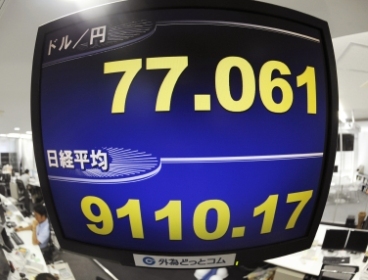BANGKOK (AP) -- Asian stock markets jumped Wednesday following a surge on Wall Street triggered by a Federal Reserve pledge to keep interest rates super low for the next two years to help the ailing U.S. economy.
Oil prices rose to near $82 a barrel, while the dollar slid against the yen and the euro.

The Dow Jones industrial average finished Tuesday with a 429-point gain after the Fed said it would keep its key interest rate at a record low of nearly zero through the middle of 2013. The index dived 634.76 points the day before after Standard and Poor's cut the U.S. government's credit rating, sending shock waves through global markets.
The U.S. central bank also said it discussed ``the range of policy tools'' it can use to spur the economy.
Still, analysts warned investors to brace for more sharp swings in markets amid a dearth of signs of improvement in the global economy.
``There is a lot of fear and uncertainty in the market, and negatives will add to that. So if we see an increase in unemployment from the U.S., that is going to cause an increase in volatility,'' said Samuel LeCornu, portfolio manager at Macquarie Funds Group in Hong Kong.
Japan's Nikkei 225 index climbed 1.3 percent to 9,057.84 following a 7.6 percent loss in the last three days. Export shares, however, continued to struggle because of the strong yen, which hurts the country's export-driven economy by reducing the value of foreign earnings.
Honda Motor Co. lost 1.5 percent and rival Toyota Motor Corp. was down 0.4 percent. Consumer electronics giant Sony Corp. fell 2 percent.
Hong Kong's Hang Seng jumped 3.3 percent to 19,963.60. Australia's S&P/ASX 200 index rose 2.6 percent. Indexes in Taiwan, the Philippines and mainland China were also higher.
South Korea's Kospi, which at one point Tuesday plummeted nearly 10 percent, gained 1.3 percent to 1,823.85. Samsung Electronics, the top global manufacturer of flat screen televisions, memory chips and liquid crystal displays, gained 0.7 percent.
Gains in Asia were broad-based, with banking shares among the key movers. Australia's Westpac Banking Corp. was 5.1 percent higher and National Australia Bank Ltd. gained 5.7 percent. Bank of China rose 3.7 percent. Industrial and Commercial Bank of China, the world's biggest bank by market value, gained 2.6 percent.
Shares in airlines, benefiting from expectations that lower oil prices will reduce jet fuel costs, were also sharply higher. Hong Kong-listed Air China climbed 4.8 percent. South Korea's Asiana Airlines climbed 3 percent and Taiwan's EVA Airways Corp. soared 5.5 percent.
Worries about the U.S. economic recovery have been building since the government said that economic growth was far weaker in the first half of 2011 than economists expected. In a reversal of earlier forecasts, economists now believe there is a greater chance of another U.S. recession because the economy grew much more slowly in the first half of 2011 than previously thought.
The manufacturing and services industries barely grew in July. The unemployment rate remains above 9 percent, despite the 154,000 jobs added in the private sector in July.
Economies across the globe are also struggling.
Concerns are growing that Spain or Italy could become the next European country to be unable to repay its debts. High inflation in less-developed countries, which have been the world's main economic engine through the recovery, is another concern. China's inflation rose to a 37-month high in July.
Benchmark oil for September delivery was up $2.66 to $81.96 a barrel in electronic trading on the New York Mercantile Exchange. In London, Brent crude was up $2.68 to $105.17 per barrel on the ICE Futures exchange.
The dollar sank to 76.92 yen from 77.01 yen late Tuesday in New York. The euro strengthened to $1.4343 from $1.4222.
















![[KH Explains] Hyundai's full hybrid edge to pay off amid slow transition to pure EVs](http://res.heraldm.com/phpwas/restmb_idxmake.php?idx=652&simg=/content/image/2024/04/18/20240418050645_0.jpg&u=20240418181020)

![[Today’s K-pop] Zico drops snippet of collaboration with Jennie](http://res.heraldm.com/phpwas/restmb_idxmake.php?idx=642&simg=/content/image/2024/04/18/20240418050702_0.jpg&u=)